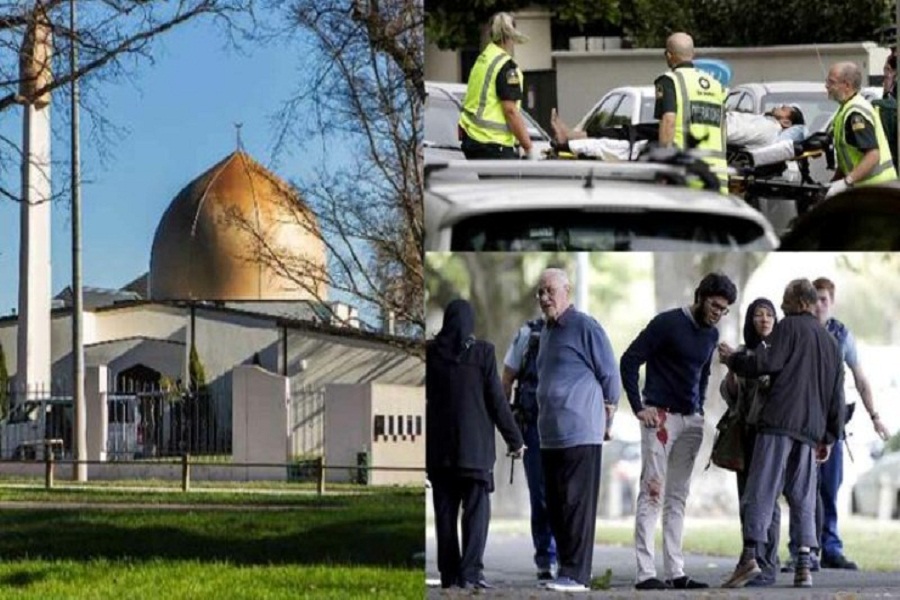
The terrorist attack on two mosques in the city of Christchurch in New Zealand on Friday claimed lives of at least 50 Muslims that had gathered there for the weekly mass prayers.
More than 24 hours has passed now from the attack, but nothing has been offered as the motivation behind the massacre.
The New Zealand Police has sufficed to revealing just tiny particles of information and the government too reacted to it very briefly.
New Zealand is a tiny country in southwest of Pacific Ocean. About 46,000 Muslims are living in the country, comprising for about one percent of the whole population.
A survey of New Zealand's media suggest that many political and social happenings there take shape under the immense influence of western media, specially the Australian ones, so, it is no hollow claim to say extremist and racist moves in New Zealand are strongly inspired by the anti-Islamic sentiments imported from the west.
Anti-Islam trend has been experiencing a very rapid growth in this remote country in the past decade due to the deep influence of western countries over the local media.
The most striking aspect of the terrorist attack is that the perpetrator who committed the massacre livestreamed it on social media. Apart from the psychological readings of this savage attack, one can focus on the bizarre behavior of the attacker whose manners prove that Islamiphobia has already taken very deep roots in the heart and soul of New Zealand-Australian racists.
Although Australia boasts itself a country open to immigrants, the state has restricting Muslims entry. That is seen especially true after some racist politicians have made their way into the government and parliament and are actively at work to reduce the number of Muslim migration through Islamophobic attempts.
New Zealand, that's been heavily influenced by its Big Brother Australia in forming socio-political and economic relations, has been witnessing a rise in racism in the country. The growing trend has been sounding the alarm in the tiny Pacific nation, making its Human Rights Commission to launch an anti-racism campaign, called ‘Give Nothing To Racism’.
'Racism is a Kiwi problem,' reads the campaign's website. 'It isn’t new and it’s growing: 1 in 3 complaints to the Human Rights Commission are about racial discrimination; most people who experience racism don’t complain; and we’re seeing an increase in overt racist attacks. People from some ethnic minorities tell us they’re scared and they’re particularly scared for their children,' it had warned back in 2017.
The country's Race Relations Commissioner Dame Susan Devoy said racial ethnicities are growing rapidly in the country and this has affected the people's patience threshold. 'Although racism in New Zealand isn't as big as that of Australia, we need to take actions to maintain our position with regard to ethnic diversity,' she had urged in an open letter years ago.
The Kiwi Human Rights Commission has received 400 race-related complaints per year while many of them are not reported. New Zealand has a population of 4.5 million inhabitants.
Asians make up the majority of racial victims in New Zealand, according to Commission that believes many of the racial attacks take place in work areas such as a boss refusal to let their employees of different ethnicities to take part in their own festivities.
'Many New Zealanders haven't experienced racial behavious but aren't aware that it could be a big problem in the society,' it warned.
'Though anti-immigration sentiment is common in New Zealand, Christchurch has the dubious honor of being home to the country’s largest number of extremist and white-supremacist individuals and groups. It is the largest city in New Zealand’s traditionally conservative—and overwhelmingly ethnically white—South Island,' Quartz reported.
Massey University sociologist Paul Spoonley has worked on extreme right groups in the country since the 1980s. For more than 30 years, he told the local Sunday Star Times, Christchurch had been home to a majority of these groups. The city “had a strong sense of attachment and tradition,” he said, “but it also harbored some groups that took these attachments to an extreme.”
Members of groups such as the Fourth Reich, which was established in a local men’s prison, Quartz writes, were often young, male, disaffected, and connected to crime. Nazi ideology and symbols are a common feature of these groups. Racist attacks in the city are not unusual, but have tended to focus on ethnically Asian people. They don’t just come from members of the extreme right, however.
Analysts believe the Friday attacks on mosques as places of worship where innocent people had gathered takes place amid the backdrop of an increase in powers of Islamophobic groups as well as their links with mafia-like racist movements.
'The UN and other international entities such as the Orgnanization of the Islamic Conference must take legal steps to hold the New Zealand government accountable for the terrorist attack on Muslims on this Black Friday.'
A report by Maryam Shafii
9218**2050
Follow us on Twitter @IrnaEnglish
 solhkhabar | Peace International News Agency Peace International News Agency , Peace News , International Agency News of Peace
solhkhabar | Peace International News Agency Peace International News Agency , Peace News , International Agency News of Peace